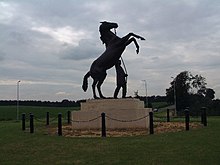
Horse racing is the second largest spectator sport in Great Britain,[1] and one of the longest established, with a history dating back many centuries. According to a report by the British Horseracing Authority it generates £3.39 billion total direct and indirect expenditure in the British economy, of which £1.05 billion is from core racing industry expenditure,[2] and the major horse racing events such as Royal Ascot and Cheltenham Festival are important dates in the British and international sporting and society calendar.
The sport has taken place in the country since Roman times and many of the sport's traditions and rules originated there. The Jockey Club, established in 1750, codified the Rules of Racing and one of its members, Admiral Rous laid the foundations of the handicapping system for horse racing, including the weight-for-age scale. Britain is also home to racecourses including Newmarket, Ascot and Cheltenham and races including The Derby at Epsom, The Grand National and Cheltenham Gold Cup. Great Britain has also produced some of the greatest jockeys, including Fred Archer, Sir Gordon Richards and Lester Piggott.
Britain has also historically been a hugely important centre for thoroughbred racehorse breeding. In fact all racehorses are called English Thoroughbred, the breed having been created in England. All modern thoroughbred racehorses can trace a line back to three foundation sires which were imported to Britain in the late 17th/early 18th centuries[3] and the General Stud Book first published by James Weatherby still records details of every horse in the breed.
Gambling on horseraces has been one of the cornerstones of the British betting industry and the relationship between the two has historically been one of mutual dependence. The betting industry is an important funder of horse racing in Great Britain, through the betting levy administered by the Horserace Betting Levy Board and through media rights negotiated by racecourses and betting shops.
- ^ Armytage, Marcus (14 January 2010). "Racing is the second most popular spectator sport". Daily Telegraph. London. Retrieved 11 April 2013.
- ^ Economic Impact of British Horseracing 2009 (PDF) (Report). British Horseracing Authority. 2009. Archived from the original (PDF) on 4 May 2012. Retrieved 11 April 2013.
- ^ Waterman, Jack (1999). The Punter's Friend. Harpenden, Herts, UK: Queen Anne Press. ISBN 1852916001.
